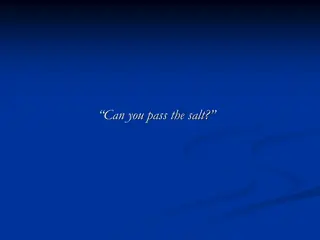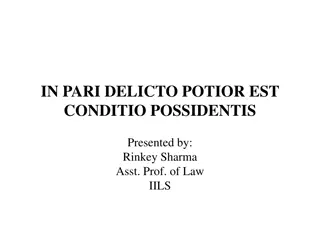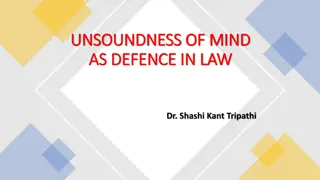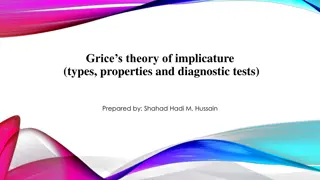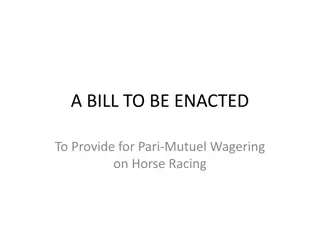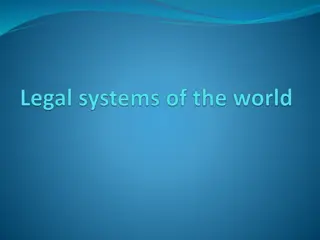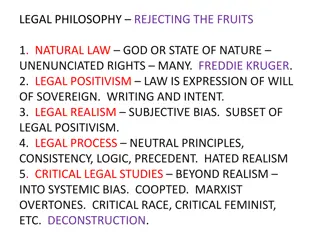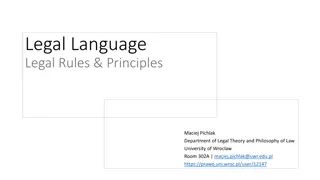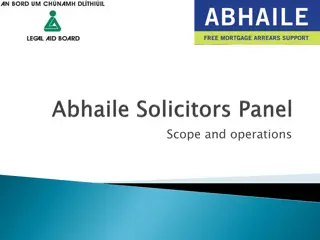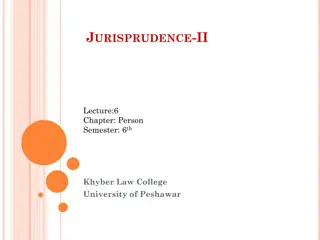Understanding the Legal Maxims In Pari Delicto and Expressum Facit Cessare Tacitum
In Pari Delicto Potior Est Condicio Possidentis is a Latin phrase meaning "in equal fault, better is the condition of the possessor." It signifies that when parties are equally at fault, the possessor has the advantage. Expressum facit cessare tacitum, another legal maxim, states that what is expressed renders what is implied silent. These maxims play a crucial role in legal interpretation and cases, as seen in Taylor v. Chester (1869) where the principle of in pari delicto was applied.
Download Presentation

Please find below an Image/Link to download the presentation.
The content on the website is provided AS IS for your information and personal use only. It may not be sold, licensed, or shared on other websites without obtaining consent from the author. Download presentation by click this link. If you encounter any issues during the download, it is possible that the publisher has removed the file from their server.
E N D
Presentation Transcript
IN PARI DELICTO POTIOR EST CONDITIO POSSIDENTIS AND EXPRESSUM FACIT CESSARE TACITUM Presented by: Rinkey Sharma Asst. Prof. of Law IILS
IN PARI DELICTO POTIOR EST CONDITIO POSSIDENTIS It is a Latin phrase for "in equal fault ,better is the condition of the possessor." This means when the parties are equally at wrong, the condition of the possessor is considered to be better. Simply put, it means a person in a wrongful act cannot sue another person in the same wrongful act. When two parties have equally wronged, courts will generally not interfere with the status quo, which is the reason why the possessor is at benefit. The doctrine is also known as the dirty hands or unclean hands doctrine.
To successfully apply the doctrine, the plaintiff must be an active, voluntary participant in the wrongful conduct, and the plaintiff's wrongdoing must be at least substantially equal to that of the defendant. Furthermore, the doctrine of in pari delicto may be subject to the "adverse interest" exception, which applies when an agent is defrauding the principal exclusively for the agent's own benefit and to the detriment of the corporation. Another exception to the in pari delicto defense is the "innocent insider" exception, which provides that if there is another agent within the corporation who had no knowledge of the fraud, and who had the will and the ability to stop the fraud had it come to his or her attention, the in pari delicto defense will fail.
Taylor v. Chester (1869) LR 4 QB 309 FACTS: Plaintiff deposited with the defendant half of alleged bank note as pledge. The debt was contracted to enjoy the services of brothel kept by the defendant. The plaintiff brought an action to recover the half note. ISSUE: Whether plaintiff could recover half bank note given to defendant as pledge for enjoying services of latter s brothel? HELD: Summary of Judgment: Maxim in pari delicto potior est conditio possidentis applies; and that as plaintiff could not recover without showing the true character of the deposit and that being on an illegal consideration of which he himself was a party, he could not recover anything. The maxim, in pari delicto is founded upon the principles of public policy, which states that courts will not assist plaintiff who has paid over money or handed over property in pursuance of an illegal or immoral agreement, fully knowing its nature. The true test for determining whether plaintiff and defendant were in pari delicto is by considering whether plaintiff could make out his case without the aid of illegal transaction of which he himself was party. In present case, illegality was not collateral to the contract but the direct result of the transaction upon which the deposit of half note took place. Hence, judgment for defendant.
EXPRESSUM FACIT CESSARE TACITUM Expressum facit cessare tacitum is a legal maxim that means what is expressed makes what is implied silent. This form of construction is used while interpreting statutes, contracts and deeds. When a matter is clearly provided in a document, the clear and precise meaning is to be adopted. The implied meaning need not be adopted when a clear meaning is provided. For example, when a condition is provided that a contract should be fulfilled on a certain date, the tactic construction that the contract should be fulfilled within a reasonable time need not be adopted. When an express date is provided for repayment of a debt, the creditor cannot demand payment before that date.
Union of India v. Tulsiram Patel, AIR 1985 SC 1416. It is always safer to apply plain and primary rule of construction. The first and primary rule of construction is that intention of the legislature is to be found in the words used by the legislature itself. The true or legal meaning of an enactment is derived by construing the meaning of the word in the light of the discernible purpose or object which comprehends the mischief and its remedy to which an enactment is directed. This well-known maxim is a principle of logic and common sense and not merely a technical rule of construction.


